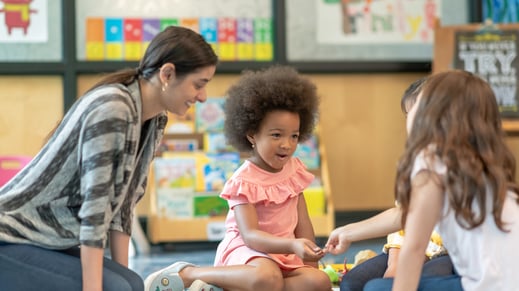
Last week we hosted Back to School with Meaningful Interactions, our first week-long free Teacher Series for nearly 4,000 early childhood educators. Each day attendees could choose from three 45-minute sessions that focused on what matters the most—meaningful classroom interactions.
After a year of school closures, virtual learning, and social distancing, this event focused on easing the transition back to school by building relationships, being responsive, creating routines, and engaging with families. Each session offered concrete ways educators can prioritize their children’s social and emotional development as they start the new school year.
Put Relationships First
Things are still feeling uncertain, but we’re more prepared this year. As we enter this school year acknowledging the trauma experienced by children and families, we can use that knowledge to help prioritize children’s social and emotional learning and development. Although trauma can affect student behavior, one important way for educators to combat these negative impacts is to cultivate meaningful connections with each student. In the session, Building Connections at Center Time, Tara Scott shared a few other ways teachers can promote relationships with children and their peers.
-
-
- Before center time starts, encourage children to greet one another and work together to foster a more positive environment.
- Give children opportunities to interact with peers and help each other with activities.
- Show excitement about the children’s comments or actions, matching their affect.
- Provide positive statements that highlight the children’s accomplishments or continuing tasks.
-
This focus on relationships and routines is effective across age levels. As we establish predictable and consistent routines, toddlers also gain a sense of security and self-confidence.
Engage Families
Ongoing COVID-19 safety measures might mean families can no longer come into classrooms, join activities, or observe the classroom. This can make it challenging to keep them involved and knowing how best to support their children. In the session, Family Engagement and Connection, Joanna Parker shared a few strategies for keeping families feeling connected despite ongoing changes.
-
-
- Learn how families want to connect and communicate with you and the program.
- Ask families about their home language, family values, traditions, and work.
- Convey that you respect their unique knowledge, history, and experiences.
- Share your philosophy and approach to teaching and the critical components of your program.
- Review your classroom or program’s schedule, routines, and practices.
- Make adaptations as appropriate to integrate the families’ home language, values, traditions, and ways of being.
-
And as plans likely continue to change, it’s best to be transparent with families as you partner with them in a culture of continuous quality improvement.
Celebrate Your Success!
And finally, let's not forget to take a step back and celebrate the successes. Teachers have become more creative, flexible, and resilient than ever. Each session was a celebration of the meaningful impact teachers make and a reminder to each educator that you are not alone!
As attendees shared ideas, questions, and celebrations with one another, the incredible power of a support network was clear! As you continue to have questions or want to connect with others facing similar challenges, we encourage you to participate in our CLASS Learning Community. It’s free and open to all.

